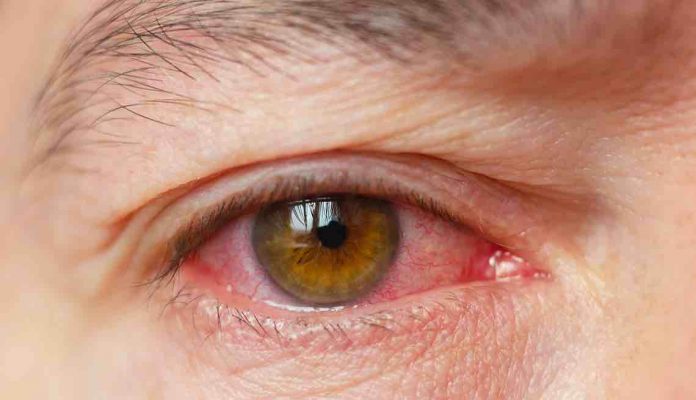AS the pandemic has evolved, we’ve come to understand more about the symptoms of coronavirus.
Whilst the key signs are a fever, a cough and a loss of taste and smell, it’s also becoming clear that there are other less common symptoms.
Experts now believe that having problems with the eyes could be an indicator that someone has contracted Covid-19.
A recent study found that having sore, itchy eyes was one of the most significant ocular symptom in Covid patients.
The findings, published in the BMJ Open Ophthalmology, also found light sensitivity, known medically as photophobia, was another sign.
Researchers from Anglia Ruskin University studied data from 83 Covid-19 patients.
They found the most reported symptoms were dry cough (66 per cent), fever (76 per cent), fatigue (90 per cent) and loss of smell/taste (70 per cent).
But looking in more detail at eye-related symptoms they found 18 per cent had suffered from photophobia, 17 per cent had itchy eyes and 16 per cent had sore eyes.
They found that the frequency of sore eyes was significantly higher while experiencing the main Covid symptoms, rather than beforehand.
But 81 per cent had reported to have experienced the eye symptoms within two weeks of other Covid symptoms.
Four in five patients said the eye-related problems lasted for less than two weeks, and there was no difference between male and females.
PREVIOUS STUDIES
Reports have suggested that Covid-19 may cause eye infections such as conjunctivitis.
And the World Health Organisation lists it as one of the less common coronavirus signs.
Early in the pandemic, Italian researchers found Covid could remain in a person’s eyes for up to 21 days after they first develop symptoms.
Scientists at the National Institute for Infectious Diseases found a 65-year-old woman had red, infected eyes before the classic coronavirus signs showed.
The team treating the patient started swabbing the woman’s eyes – taking samples of her eye fluid almost every day following that.
Every sample revealed genetic material (RNA) from the virus that causes Covid-19, also known as SARS-CoV-2.
The virus remained in the woman’s eyes for exactly three weeks – until she was discharged 21 days after she was admitted to hospital.
Despite this, the researchers examined her five days later and found the virus had returned to her eye fluid.
Coronavirus was still lingering in her eyes even days after her nasal swabs were clear of its genetic material.
That suggested to the researchers that the virus was continuing to make copies of itself within the woman’s eye fluid.
They warned that conjunctivitis could be an early sign of Covid.








